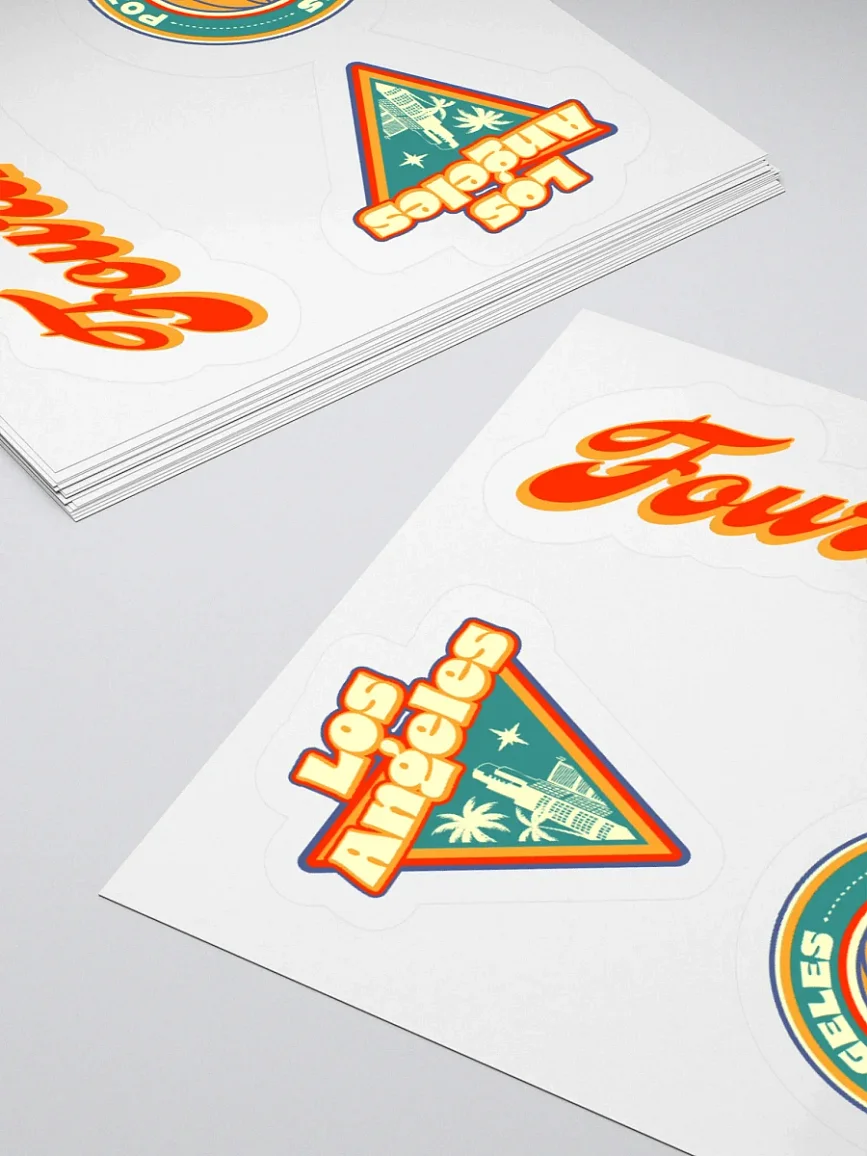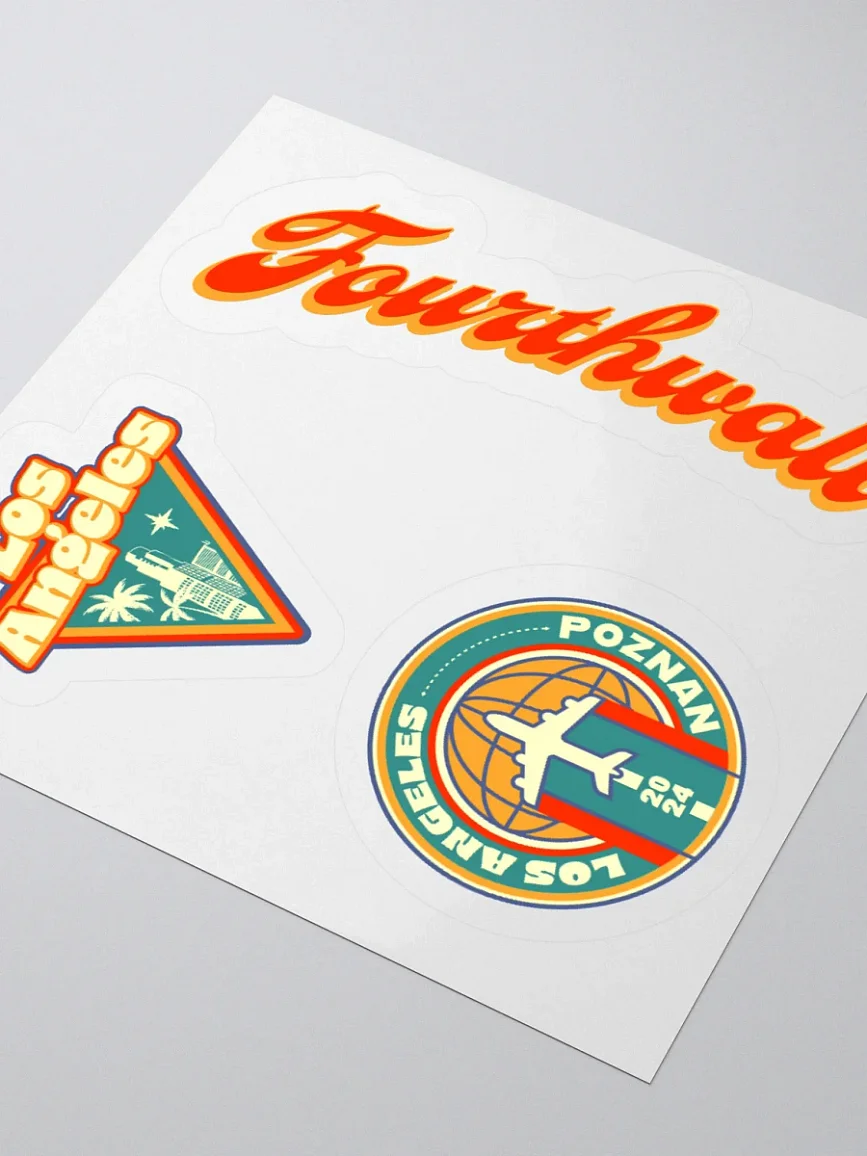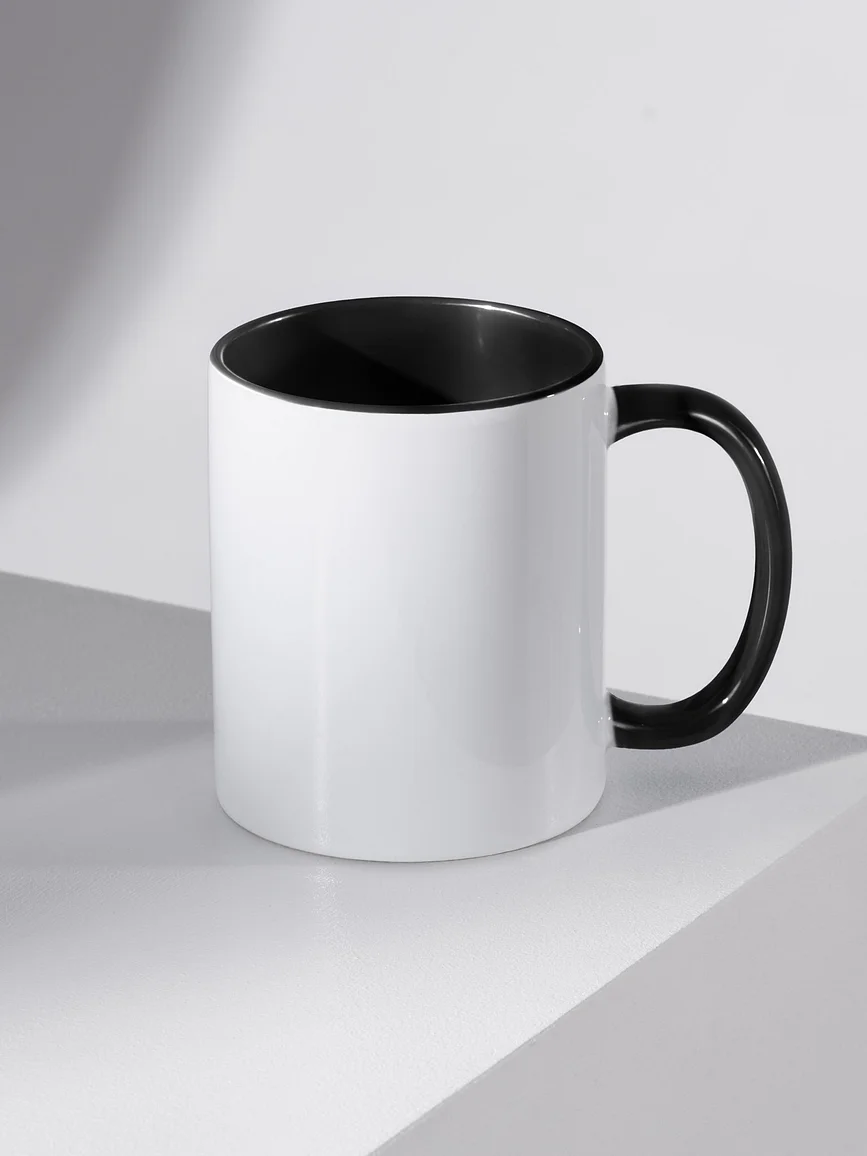10 Best Printify Alternatives for Your Merch

Choosing the best print-on-demand (POD) platform is so important for creators looking to expand their brand through custom merchandise. Printify has long been a popular platform in the print-on-demand category, well known for its wide range of products, competitive pricing, and global network of print providers.
But compared to other POD companies, Printify can fall short in a few areas. Printify's reliance on multiple third party print providers can lead to inconsistencies in product quality and shipping times, potentially affecting customer satisfaction. Also, while Printify offers a free plan to users, its premium (cost) plan is necessary to access the best discounts and features, and may not be justifiable for smaller businesses or individual creators with limited budgets.
So while Printify has become a staple in creating and selling branded merchandise, it's not the only game in town. Many other platforms offer unique features and benefits, catering to different needs and preferences. We'll show you some of the best Printify alternatives from Fourthwall to Zazzle for selling products; and we'll explore their key features, pros and cons, and pricing to help you make an informed decision for your POD needs.
What to Look for in a Printify Alternative
When choosing a print-on-demand (POD) platform, it's essential to consider all of each platform's factors to make sure you select the best fit for your business. Here are some important factors to consider:
1. Product Selection
A diverse range of items allows you to sell products aimed at your audience's different tastes and preferences, so look for a platform that offers a wide array of custom product choices, from clothing and accessories to home decor, plus some more niche products. Printify may have a large amount of items, but you'll want to look for quality, not just quantity.
Additionally, the ability to customize products extensively, with options for multiple designs, colors, and custom text, can really help your merchandise stand out.
2. Profit Margin
Evaluate the base cost of the platform's products; lower base costs typically result in higher profit margins, allowing you to price your products competitively.
Also, consider any additional fees the platform might charge, such as transaction fees, subscription fees, or premium account costs, as these can affect your overall profitability.
3. Sustainability
Many consumers are increasingly eco-conscious, preferring to buy sustainably made products, so you might want to check and see if the platform offers eco-friendly materials and sustainable production practices.
You can also evaluate the platform’s commitment to reducing its ecological footprint, such as minimizing waste, using renewable energy, or supporting environmental causes. (Printify's sustainability metrics aren't the best.)
4. Seamless Integrations
The ability to seamlessly integrate with popular ecommerce platforms (like Shopify, WooCommerce, and BigCommerce) can really help streamline your sales process.
Additionally, integrations with social media platforms like Instagram and TikTok can help you reach a wider audience and sell directly through your social channels. Sites like Fourthwall can even integrate with TikTok Shop; YouTube Shopping; and Twitch chat via their "Twitch Gifting" feature that allows viewers in a streamer's chat to gift the streamer's merchandise to other viewers!
5. Customer Support
Look for platforms that offer reliable customer support, as the availability of 24/7 support can be crucial for resolving issues promptly; multiple support channels - like email, chat, and phone - can provide flexibility in seeking help.
Also, check to see if the platform you're considering has a comprehensive knowledge base, tips blog, or community forum for additional assistance.
The Top 10 Printify Alternatives for Your POD Needs
1. Fourthwall
.webp)
Fourthwall is a comprehensive, all in one ecommerce platform with an extensive product catalog featuring hundreds of retail quality print-on-demand (POD) items, plus a wide range of customization options and features.
Fourthwall's platform stands out among other POD platforms because of its competitive pricing. It offers lower cost, high quality apparel, making it an attractive option for creators looking to maximize their profit margins.
The platform also offers creators a range of advanced printing options, including direct-to-garment (DTG), embroidery, screen printing, direct-to-film (DTFx), and sublimation printing. These options allow creators to bring their designs to life with precision and vibrancy, ensuring high-quality outputs for a variety of products, such as t-shirts, hoodies, wall art, bags, and more.
With fulfillment centers in the US, EU, UK, and Australia, Fourthwall provides worldwide shipping, ensuring fast and affordable delivery for creators and their communities. This extensive shipping network helps creators reach a broader audience without worrying about long delivery times or high shipping costs.
And in addition to its custom product and print-on-demand offerings, Fourthwall provides creators with an array of incredible features designed to enhance their selling experience, including mobile apps for shops; promo codes for customers; custom domains; social media integrations; customer support; and comprehensive analytic tools that provide insights into sales, customer, and store metrics.
Pricing: Fourthwall is free to use; the platform takes 3% or less on print on demand products, and a 5% flat fee on memberships.
Pros:
- All in one ecommerce platform.
- Built-in website builder.
- Competitive apparel costs.
- Custom mobile apps and custom domain integration.
- Ability to sell both digital and physical products.
- Integrated shopping features, including YouTube Product Shelf, TikTok Shop, and Twitch Gifting.
Cons:
- Limited product options in some categories, including makeup, sports products, and consumables.
2. Printful

Printful offers high quality printing with no order minimums and an intuitive site interface, making it a user friendly option for print-on-demand (POD) services.
This ease of use extends to its seamless integration with multiple ecommerce and online platforms, including Shopify, Etsy, BigCommerce, and WooCommerce, which allows creators to choose their preferred marketplace.
One of Printful’s standout features is its mockup generator, which allows creators to visualize their designs on more than 300 available products, including apparel items, accessories, digital products, and home goods. This tool simplifies the design process by enabling users to see exactly how their products will look before they go live.
Printful's product range enables creators to cater to different customer preferences and expand their offerings without managing inventory or dealing with upfront costs.
Pricing: Free to use, pay per product ordered.
Pros:
- High quality printing ensures professional looking products.
- No order minimums allows for flexible order sizes.
- Automated fulfillment and shipping.
Cons:
- Need your own storefront, which means you'll have to pay third party platforms like Shopify.
- Have to provide your own customer support.
- Some categories have very few products.
- Printify refunds are only permitted for lost or damaged products.
3. Sellfy
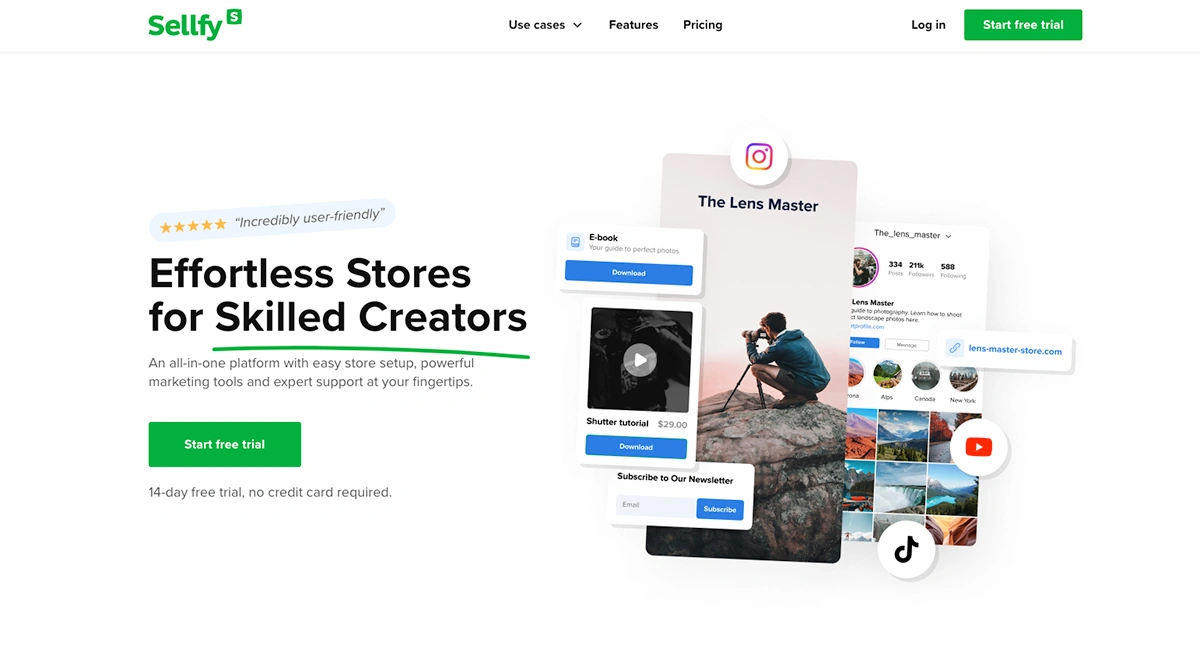
Sellfy offers a wide range of digital goods and apparel, including ebooks, music, T-shirts, hoodies, and hats, and enables creators to set up a personalized online store without extensive technical knowledge.
However, while Sellfy’s platform is user friendly, it offers limited options for site customization compared to more advanced ecommerce platforms. This might be a consideration for creators who want highly tailored storefront designs.
Despite the customization limitations, Sellfy supports integration with various platforms, such as Facebook, Patreon, and Etsy. This provides users with multiple avenues to expand their reach and streamline product sales. These integrations can help creators manage their business operations more efficiently and tap into existing audiences on these platforms.
Pricing: Paid plans start at $22/month.
Pros:
- Intuitive interface is easy to navigate
- Wide range of product options.
- Provides excellent email marketing tools.
Cons:
- Limited customization options.
- Higher fees for processing payments.
- Limited shipping options.
- No integration with social media shops.
4. Spreadshirt

Spreadshirt offers over 250 custom printable items, including T-shirts, hats, mugs, phone cases, and more. The product range provides creators with a diverse array of products to customize and sell, so that they can find the perfect items to suit their brand and audience.
Spreadshirt functions as both a print-on-demand (POD) website and a marketplace for designed products. This dual functionality allows creators to choose how they want to sell their products.
For those with Shopify stores, Spreadshirt integrates seamlessly, enabling products to be published directly on their storefronts. This integration streamlines the process for Shopify users, allowing them to manage their products and sales in one place. For creators without their own e-commerce stores, Spreadshirt's marketplace offers a platform to sell custom product designs directly to a broad audience.
The platform also supports various printing methods, including digital direct, thermal sublimation, plot printing, and embroidery. These options ensure high-quality and versatile customization, allowing creators to produce detailed and durable designs on their products.
Pricing: Free to use, pay per product ordered.
Pros:
- Good quality prints.
- Easy-to-use interface.
- Integration with YouTube Merch Shelf.
- Provides customer support.
Cons:
- Limited product varieties.
- Limited customization options for storefronts.
- Shipping costs can be high.
- Three-color maximum for higher-quality print designs.
5. Teespring (Spring)
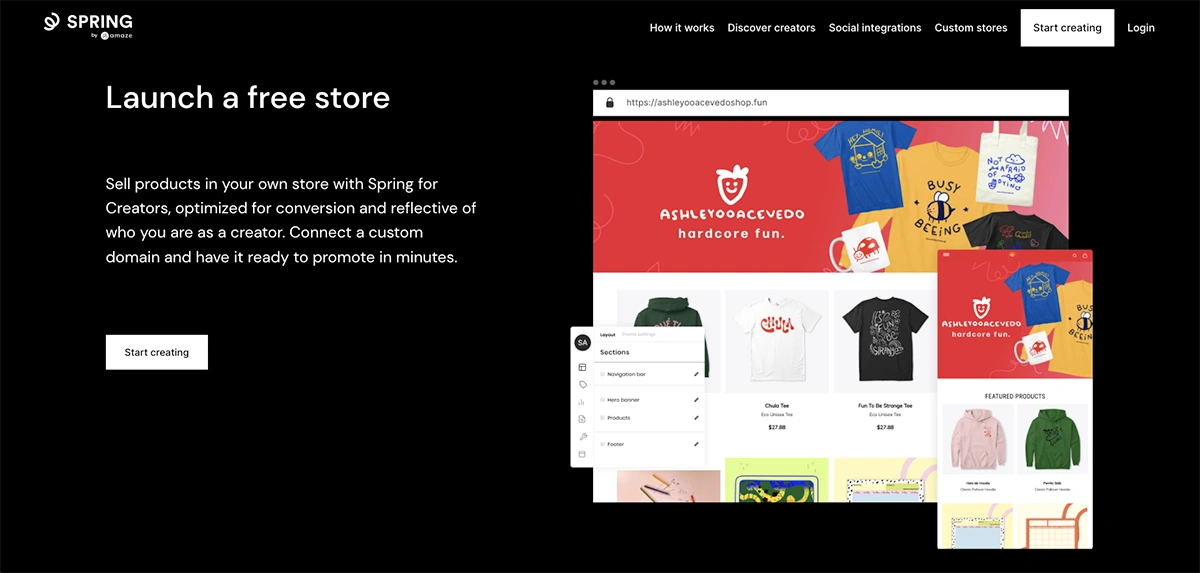
For years, Teespring, now known as Spring, has been a dominant force in the print-on-demand industry, providing users with an impressive catalog of products while handling production and shipping at limited cost. The platform offers a wide range of customizable items, including T-shirts, hoodies, mugs, posters, and phone cases, allowing creators to cater to diverse audiences and expand their product offerings.
In addition to being a user friendly platform that simplifies the creative and selling process for creators, the platform has recently added an innovative integration with YouTube. This integration allows YouTube creators to directly link their merchandise to their videos and channels, enabling viewers to purchase products without leaving the platform.
Furthermore, Spring offers various promotional tools and analytics, such as discount codes, email marketing campaigns, and social media sharing options to help boost sales.
Pricing: Free to sign up.
Pros:
- Impressive product catalog.
- Can ship products to over 180 countries around the world.
- YouTube integration tools.
- Impressive marketing tools and partnership integration features.
Cons:
- Higher prices for certain products.
- Delayed payouts.
- Lack of customer support.
6. Redbubble

Redbubble's print-on-demand offerings include nearly 80 unique products to choose from, ranging from. A regular Redbubble account includes your own shop, print-on-demand with global shipping, customer support, and the ability to choose pricing; higher Redbubble accounts add features like advanced customer metrics, special sales notices, and additional promotional and marketing opportunities.
The different Redbubble accounts (Standard, Premium, and Pro) are classified by Redbubble, ranging from a completely new starter store, through stores with a unique brand or established customer base, up to artists in Redbubble's top sellers program.
Pricing: A Redbubble account and store are free to start; the Standard store may be subject to an account fee. Sellers pay an additional flat fee on sales, based on Redbubble's fee table.
Pros:
- No up front investment needed
- Setup process is fairly easy, as is listing products
- Control over your profit margins
- Redbubble has a decent amount of traffic to their site
Cons:
- Fairly small product catalog
- Limited customer support
- If you design a lot, you might feel limited by Redbubble's max of 30 uploads per day
7. Gelato

Gelato is a global print-on-demand platform that stands out for its commitment to eco friendly materials and readily available email customer support. These features make it an attractive option for creators and businesses that prioritize sustainability and seamless operations.
One of Gelato's key advantages is its intuitive mobile app, which allows users to manage their POD business on the go. The app provides a comprehensive suite of tools for designing products, tracking orders, and monitoring sales. This mobile accessibility ensures that creators can stay connected to their business and respond quickly to customer needs, no matter where they are.
The platform’s dedication to sustainability is another major selling point. The company uses eco friendly materials and processes to minimize its environmental impact. By sourcing responsibly and focusing on sustainable production methods, Gelato appeals to environmentally conscious consumers who value green practices.
Pricing: A free plan is available; paid plans start at $25/month.
Pros:
- Intuitive mobile app allows for easy management on the go.
- Eco-friendly materials appeal to environmentally conscious consumers.
- Easily-available email customer support.
Cons:
- No phone or chat support, limiting immediate assistance.
- Basic selection of products may not meet all users' needs.
- No stock images without a paid account.
8. Gooten

Gooten is a print-on-demand platform that offers creators an easy way to expand their product offerings and streamline their ecommerce operations. With its global network of manufacturing partners, Gooten ensures high quality products, ranging from apparel and drinkware to unique items like glass cutting boards and acrylic trays.
Its standout features include centralized order management, seamless integration with popular platforms like Shopify, Etsy, and WooCommerce, and a loyalty program that rewards merchants with personalized reports, insights, and discounts.
Gooten's localized production facilities also help optimize shipping times and costs, making it a top choice for creators looking to scale their businesses efficiently.
Pricing: Free to use, pay per product ordered.
Pros:
- Gooten's platform integrates with major eCommerce platforms like Shopify, Etsy, and WooCommerce.
- Its loyalty program rewards merchants with perks such as discounts, personalized reports, and insights.
- Gooten is committed to using eco-friendly production practices.
Cons:
- Fulfillment times can be slightly longer compared to some competitors.
- Creators do not have the option to choose specific manufacturers for production.
- While Gooten optimizes shipping by using localized production, international shipping fees can still be costly for global customers.
9. Teelaunch

Teelaunch is another cost effective option for POD services, offering a wide range of high quality branded products that can be customized to suit various customer needs and preferences.
One of Teelaunch's standout features is its automated profit calculation tool. This tool allows sellers to set their prices and automatically calculate profits based on production and shipping costs; Teelaunch also doesn't require subscription fees, making it an attractive option for budget conscious users or those just starting out in the POD industry.
Users also only pay for the products they sell, ensuring that there are no upfront costs or financial risks associated with using the platform.
Pricing: Free to use, pay per product ordered.
Pros:
- Automated profit calculation simplifies financial tracking.
- Teelaunch's branded products add a professional touch.
- No subscription fees reduce upfront costs.
Cons:
- Teelaunch only has limited integrations with other platforms.
- Also limited are Teelaunch's white labeling options
10. Zazzle

Zazzle allows creators to offer a wide range of products, including apparel, business cards, stationery, home goods, and more; but what really sets Zazzle apart are its robust design tools and mockup generator. These tools allow sellers and buyers to personalize products with custom text, images, and designs, making it easy to create one of a kind items.
Sellers earn royalties on each sale, with rates calculated based on the product type and sale price.
Zazzle also provides various promotional tools, such as discount codes, sales events, and an integrated affiliate program, enabling creators to increase their visibility and earnings; and they handles all fulfillment aspects, including printing, shipping, and customer service, allowing creators to focus solely on design.
Pricing: Signing up for Zazzle is free, and there are no upfront costs. Creators can opt to access the Zazzle Plus subscription for $9.95/year, which includes free shipping on select products.
Pros:
- Provides options like discount codes, sales events, and affiliate programs to help sellers market their products and earn more.
- Sellers can manage multiple stores under a single account.
- Offers an intuitive design tool that enables creators to easily create and modify designs for a wide range of products.
Cons:
- Due to transaction fees, seasonal discounts, and affiliate referral cuts, sellers may experience lower profits compared to other platforms.
- Creators have minimal control over packaging, customer communication, and overall branding.
- Zazzle’s seasonal promotions may lower the royalty earnings for creators, as discounts are often applied without seller input.
11. Print Aura

Print Aura stands out in the print-on-demand (POD) industry by offering creators a wide range of customizable products, including T-shirts, hoodies, hats, bags, and home decor items, and the platform's commitment to quality is evident in its use of high quality printing techniques, such as direct-to-garment (DTG) printing. These techniques ensure that the designs are not only vibrant but also durable, meeting the expectations of both creators and their customers.
Print Aura also offers a user friendly business model that requires no paid subscription. This approach significantly lowers the barrier to entry for small businesses and individual creators, allowing them to access Print Aura's full suite of services and features without any upfront costs.
Creators only pay for the products they sell, which is beneficial for those starting out or operating on a tight budget.
Pricing: Free to use, pay per product ordered.
Pros:
- No minimum order allows for flexible order sizes.
- Good customer service supports users effectively.
- No requirement for a paid subscription lowers entry barriers.
Cons:
- Outdated platforms may not offer the best user experience.
- Expensive shipping, in some cases, can increase costs.
- Slow customer service response times.
12. JetPrint

With over 450 products available for customization, including unique items like custom shoes, watches, bags, and home decor such as tapestries, JetPrint allows you to design products that align with your brand vision. Jetprint's platform also provides an intuitive mockup generator to upload your designs and easily customize products, offering real time previews.
JetPrint supports integrations with Shopify and WooCommerce, making it simple to sync and manage your store, and offers a no minimum order policy, which means you can order just one item or bulk quantities without the pressure of stocking inventory.
With competitive pricing, no upfront costs, and worldwide shipping, JetPrint is a good choice for creators who want to start selling branded products without significant upfront investment.
Pricing: JetPrint is free to sign up with no monthly charges.
Pros:
- Creators can brand their products and packaging with custom logos and embroidery.
- Competitive prices, with occasional discounts of 5-8% on sample or bulk orders.
- The live preview feature allows creators to see their designs on products in real time.
Cons:
- Creators may encounter occasional printing errors or quality inconsistencies.
- Limitations on certain types of products or styles compared to other platforms.
- Fulfillment times may be slower than other platforms.
Beyond Printify: Try Fourthwall for Your Print-on-Demand Needs!
Ultimately, the best print-on-demand platform for you depends on your unique needs and priorities. Each of the alternatives mentioned has their own strengths and weaknesses, so it's essential to evaluate them carefully against the factors discussed above.
Take the time to explore each option, considering your requirements and goals. Whether you're focused on product variety, profit margins, sustainability, seamless integrations, or robust customer support, choosing the right platform can significantly impact your success in the POD space - and this is exactly why you should consider Fourthwall!
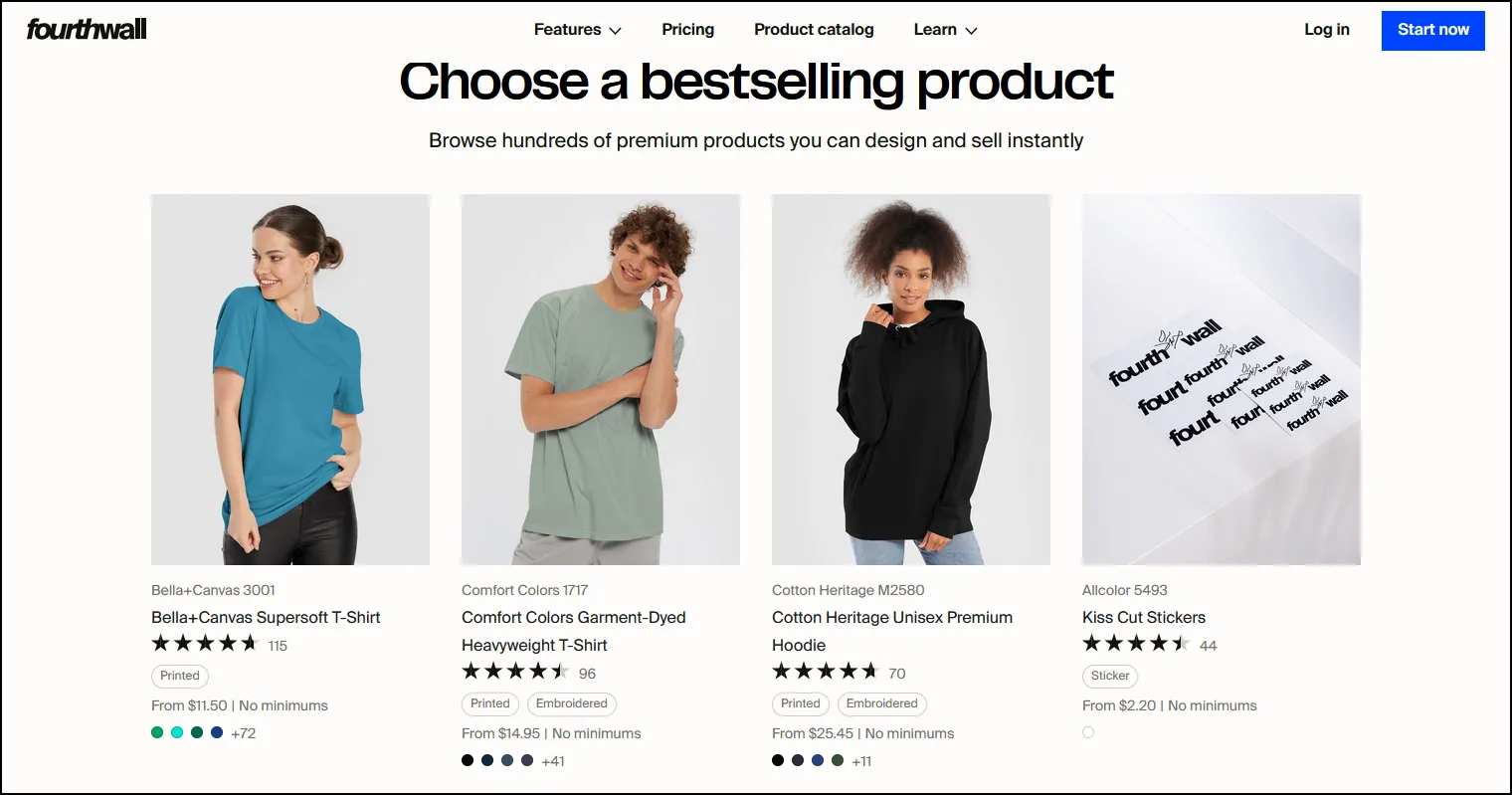
Fourthwall is a great choice for creators seeking an all-in-one solution! It offers a comprehensive print-on-demand custom merch service, integrated beautifully with plenty of website building and community features, from memberships and promo codes to video thank-you messages to your members and a custom mobile phone app.
All of Fourthwall's connected features allow you to manage your entire online presence seamlessly without any coding knowledge, making Fourthwall an excellent option for creators of all levels - join Fourthwall today and take your POD business to the next level!








